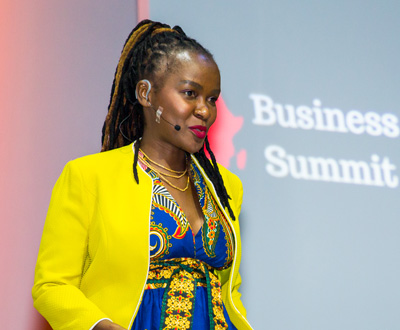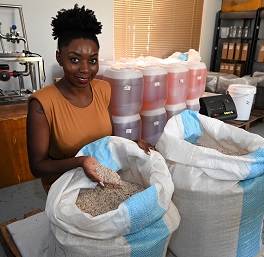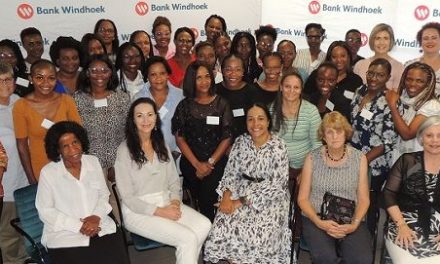
The investor who backs Africa’s women entrepreneurs – Lelemba Phiri

Lelemba Phiri is not afraid of jumping headfirst into the unknown. She lists it as one of her best qualities, a competitive advantage actually.
“When I am clear on the ‘what’, I simply take the leap. I jump in with lots of intention and clarity on where I eventually want to land, never being too perturbed about exactly ‘how’ it is all going to happen.”
The 39-year-old Zambian-born business owner and gender-lens investor believes many people become paralysed when they overthink the ‘how’, to the point where they simply can not progress their ideas forward.
This has never been her style. She credits her frequent leaps of faith as some of the best business decisions she has ever made. She encourages other entrepreneurs to be clear on their vision and the goals they want to achieve, and then… to simply go for it.
Always an entrepreneur
Phiri was born into a large middle-income family in the Zambian city of Kitwe. She finished high school, then completed her chartered accounting studies in Zambia before achieving a Bachelor of Science degree in Applied Accounting from Oxford Brookes University in the UK.
“I’ve been an entrepreneur from childhood,” says Phiri. She was already earning money from a young age by granting loans to her siblings. In college she had to contribute to the payment of her studies and started selling just about anything that could generate some income. “I was flogging everything from chicken to rice to lingerie to fish,” she laughs. Her decision to study accounting was a rational, reasoned choice because it was one of the fields of study where she could earn money in her line of work while still finishing her degree.
Her first job was as an accounts administrator in a photo shop and then she spent some time working for the Zambian revenue services. After getting married to Sandras Phiri, the pair relocated to Cape Town, South Africa.
They had savings that they thought would last them eight to ten months. So they moved with their two young children (aged five and one at the time), without a job offer in South Africa or a structured plan.
They leapt into a new chapter of their lives with only a clear vision of the ambitions they had – to build big businesses. In the nick of time – she vividly remembers having a total of R347 left in their bank account – Sandras landed a job and shortly after that, so did she.
“The times we ran out of money were definitely challenging,” Phiri says, remembering that brief bout of panic shortly after the move. “These moments test you to the brink of your faith and wits.”
She progressed from an accounting position for oilfield services company Schlumberger to regional asset manager for eight of its African markets. But while challenging, the role did not match up with her internal drive and passion.
“By the time I left that job I was feeling disoriented. I was working in this big corporate machine, not really feeling where my impact was landing. I really wanted to do something that was meaningful and where I was contributing to the solution,” she says.
The road to becoming an investor
Phiri resigned and opened up the Africa Trust Academy, providing financial education training to clients. A year later, she enrolled for a Masters in Development Finance at the University of Cape Town’s Graduate School of Business. One of her husband’s MBA classmates forwarded a career note about a money transfer startup operating in Zambia that was looking for someone to merge the cultures of its Lusaka office in Zambia with that of their Cape Town-headquarters.
The initial conversation with Zoona excited Phiri. At the time the company had about 17 employees between the two offices and had still not entered their first fundraising round. She joined as a consultant and started assisting where she could, quickly discerning what the business needed at the time: brand awareness; a strong team; and a laser-focus on customer experience. In the process of helping Zoona achieve these objectives, she fell in love with the company.
Phiri does not believe that entrepreneurship is exclusively reserved for creators. She believes there is another category of entrepreneur as well. Those who don’t necessarily create new products or services.
“Some people argue that they are not creative and therefore entrepreneurship is not an option. But I believe you have to ask yourself what unique strength you could bring to a team. Then you use that to negotiate yourself some equity in order to have a say in how strategy should be driven. That’s how it happened for me at Zoona,” she says.
Zoona appointed her permanently, first as a financial controller and then later asked her to move back to Zambia as managing director. She took the leap, again, and it paid off. In the seven years she dedicated to Zoona, the company increased its agents from 70 to over 3500, resulting in more than 5000 indirect jobs. She drove the expansion into Malawi and received that market as part of her responsibilities along with Zambia.
Phiri was actively involved in every fundraising round the company undertook. “As I was heading big parts of the organisation, I often had to lead investor conversations, taking possible funders on field tours, explaining the business and its growth potential,” she says. It was here that she picked up the experience and skills that would make a future as fund manager and investor a reality.
Creating an ecosystem where women-led business can thrive
In 2018 she left her job as chief marketing officer (her last position at Zoona) to start the Africa Trust Group (ATG). The business offers early stage gender-lens funding, entrepreneur and enterprise development, access to markets and trade facilitation as well as business research and support services. She remains a shareholder in Zoona and is the chairperson of the company’s Zambian board.
“Of course it was a difficult decision to leave, but I did feel like I got to a point where I had contributed as much value as I possibly could and my larger mission was calling me,” she says.
At the end of 2018 she announced the launch of ATG’s gender-lens investment fund at a regional SADC development finance conference. The fund had no committed investors, yet.
“That’s how I keep myself accountable,” Phiri says. “I tell the public. It’s a personal life hack.” She understood the ultimate goal post and committed to it by putting it out into the world. Thus, the announcement was technically also the start of her fundraising roadshow. She had put her vision out into the world and now had to make it a reality. Another leap taken.
It was by no means a smooth ride. When she left Zoona, Phiri had enough savings, a financial runway, of one year. What followed was meeting after meeting, connections being made, networks being tapped, knocking on doors, sharing her idea, fine-tuning her fundraising proposal deck over and over and sending it out far and wide. She leveraged her well-established networks, continuously learning and honing her pitch. But time was ticking away.
In 2019, only a month or two away from reaching the end of her runway, the right investor received her pitch. It was Sarah Dusek, one half of the management duo of Enygma Ventures in the United States.
At first Phiri simply tapped into Dusek’s expertise to further perfect her business proposal. However, after a very successful meeting in May 2019 between Sarah and Jacob Dusek with Phiri and her husband, the two companies joined forces and launched a R100 million venture capital fund to invest into women-owned or -led businesses that have the capability to grow and be scaled.
Qualifying businesses undergo an investment readiness programme led by the operating partner for Enygma Ventures in the region: Africa Trust Group.
From over 900 applicants the first cohort of 11 businesses were selected and are currently undergoing the programme. The ventures selected hail from as far and wide as Zambia, Swaziland, South Africa and Angola. It includes businesses in the consumer goods industry, such as Black Mamba (offering chili products sourced from Swaziland farmers) and MsLondon Cosmetics, to education and educare service providers such as Educartis and Playsense.
Facilitating these investments and assisting the businesses to gear themselves for growth is exactly where Phiri envisioned herself to be when she decided to leave Zoona two years ago. Although the “how” was unclear, she obtained what she deliberately set out to achieve.
Her networks were instrumental in getting her to this point. She diligently protects this asset and advises other entrepreneurs: Do not burn bridges. “I have never surprised anyone when I made a decision to leave or take a different direction. We discuss my decision and find a way to work towards it, together.” she says. Burning bridges is completely unnecessary.
“You have no idea how small the world is. Maintain those business relationships. Good goodbyes create more scope for a bigger support system for you in the future.”












































